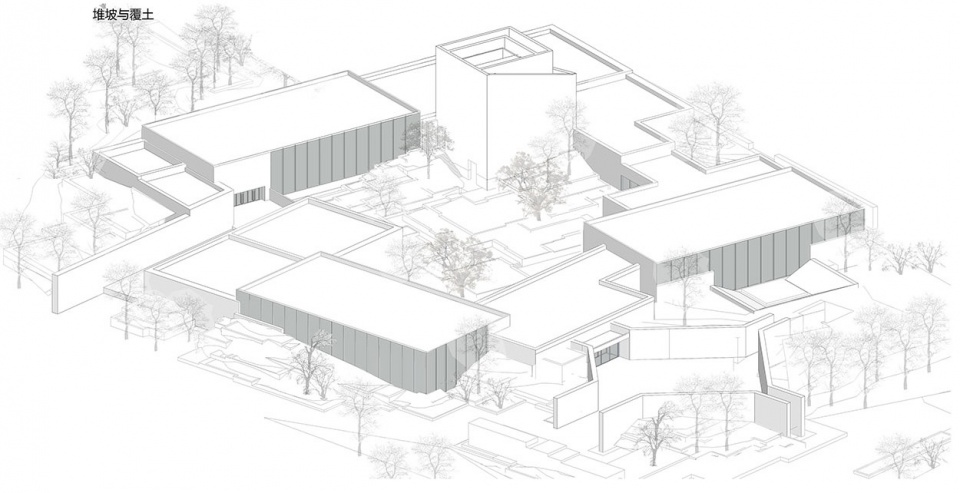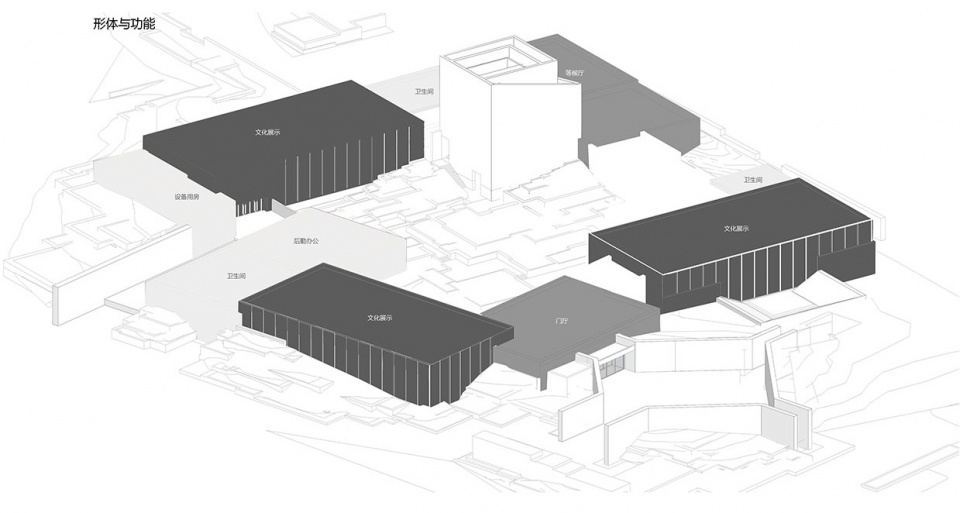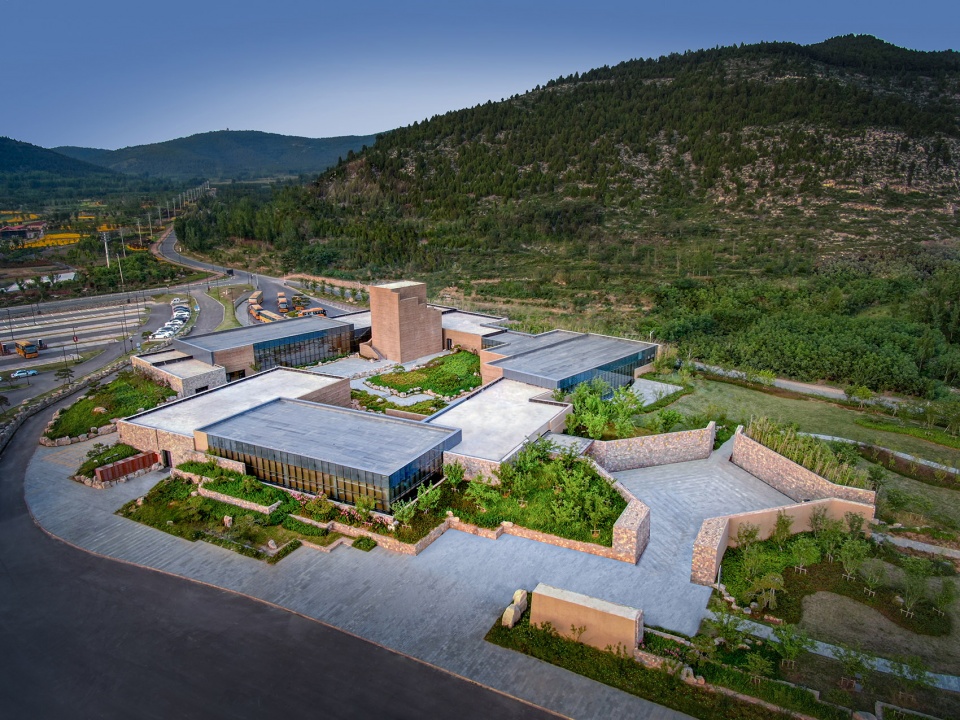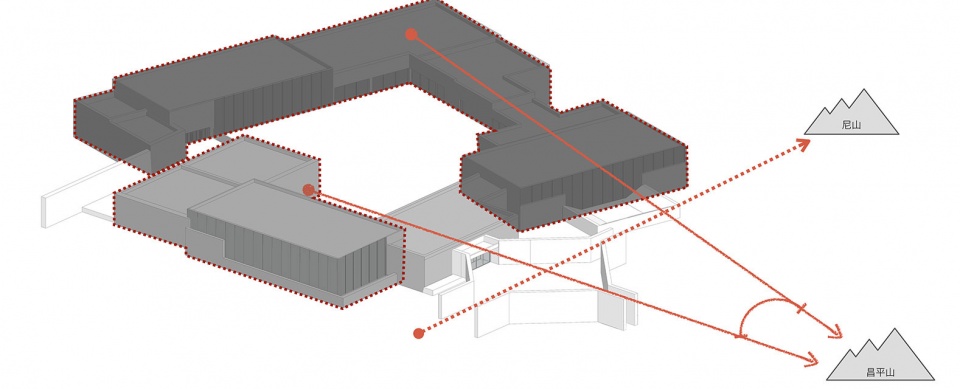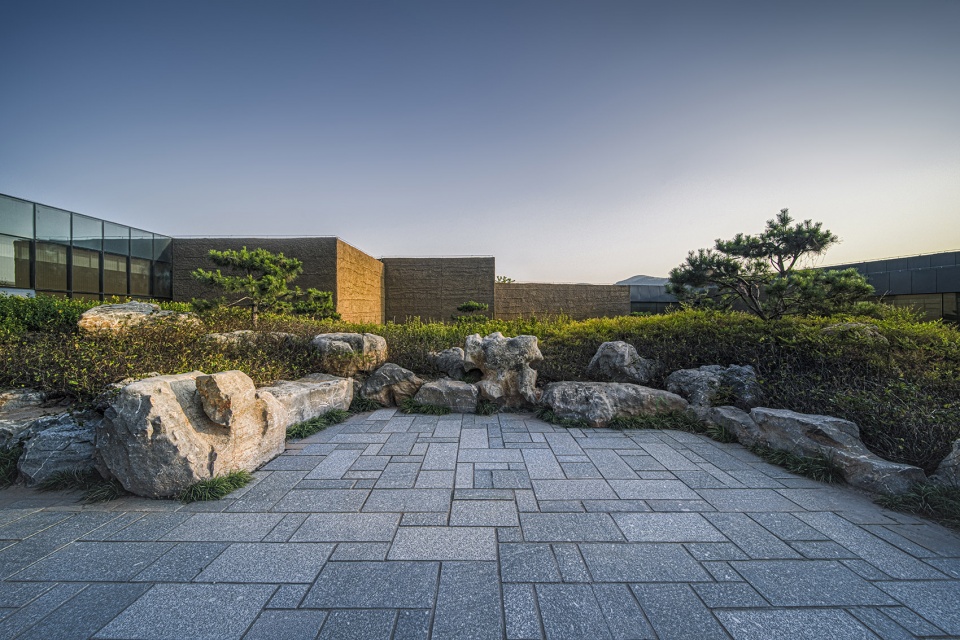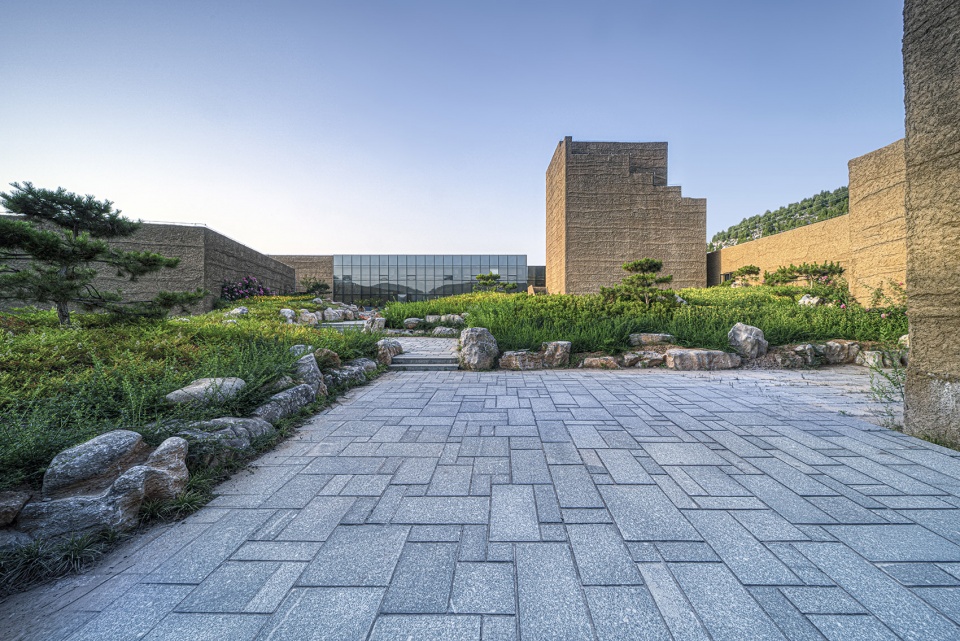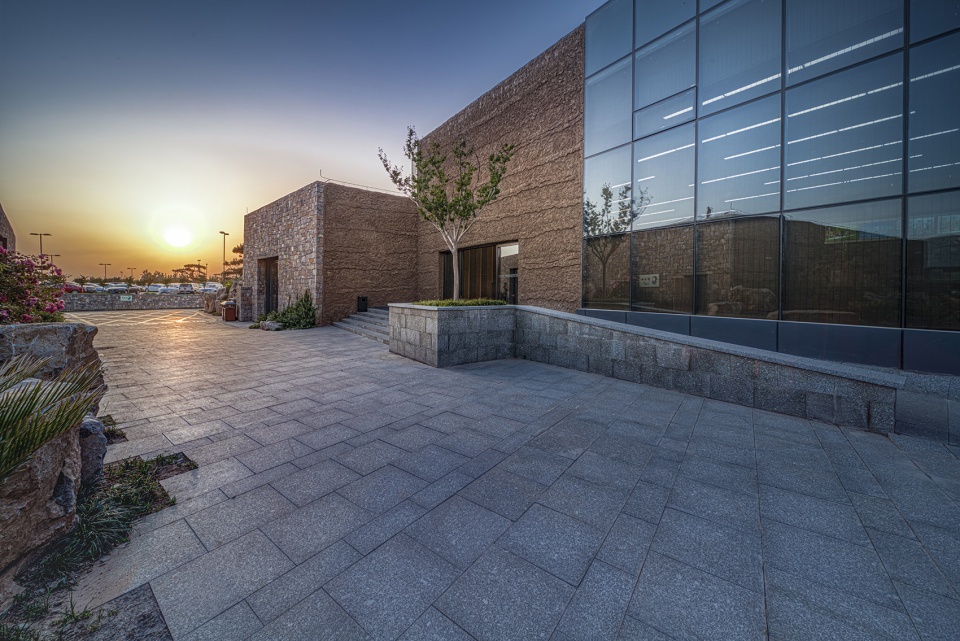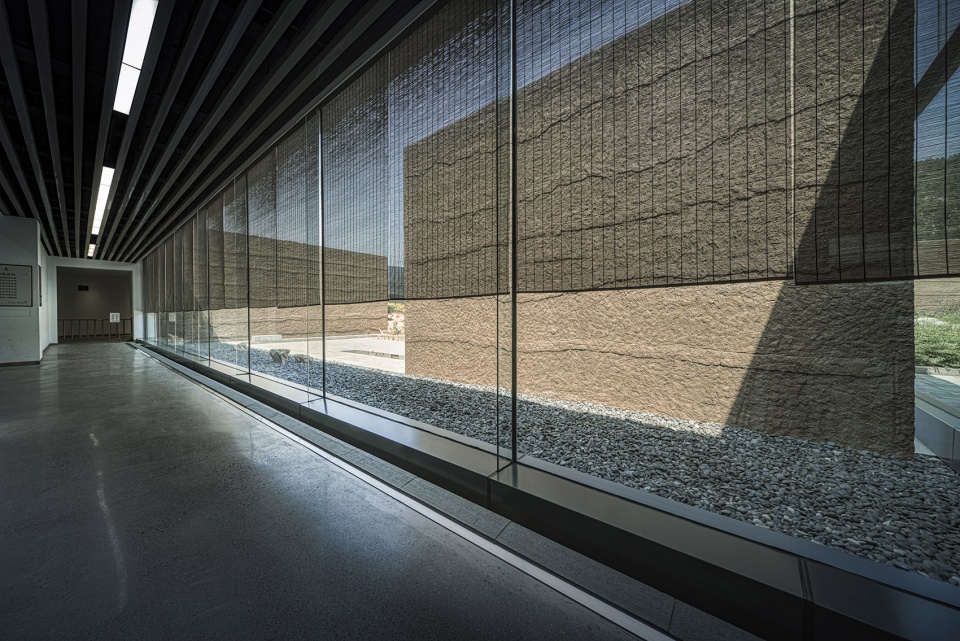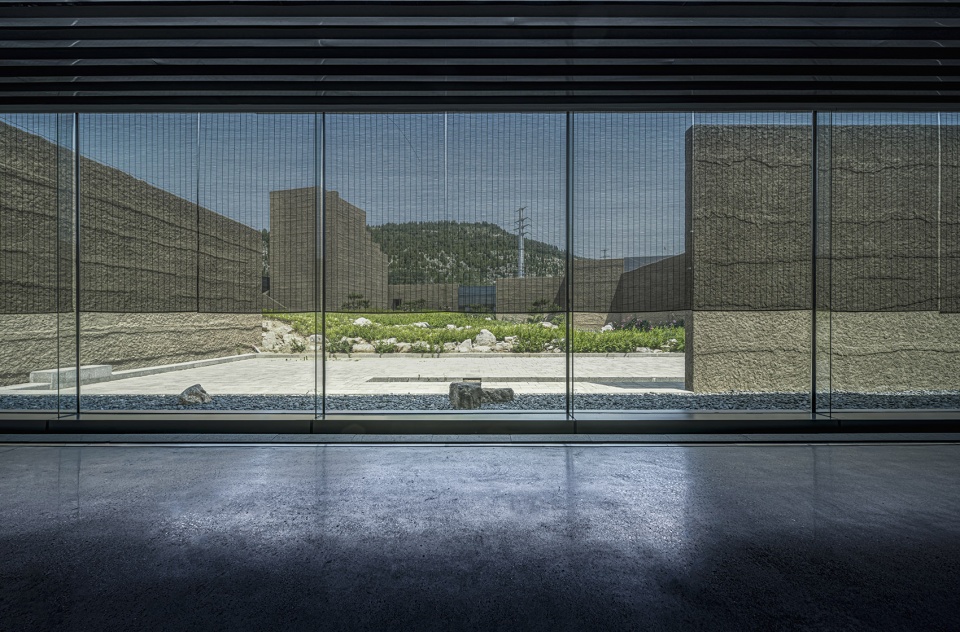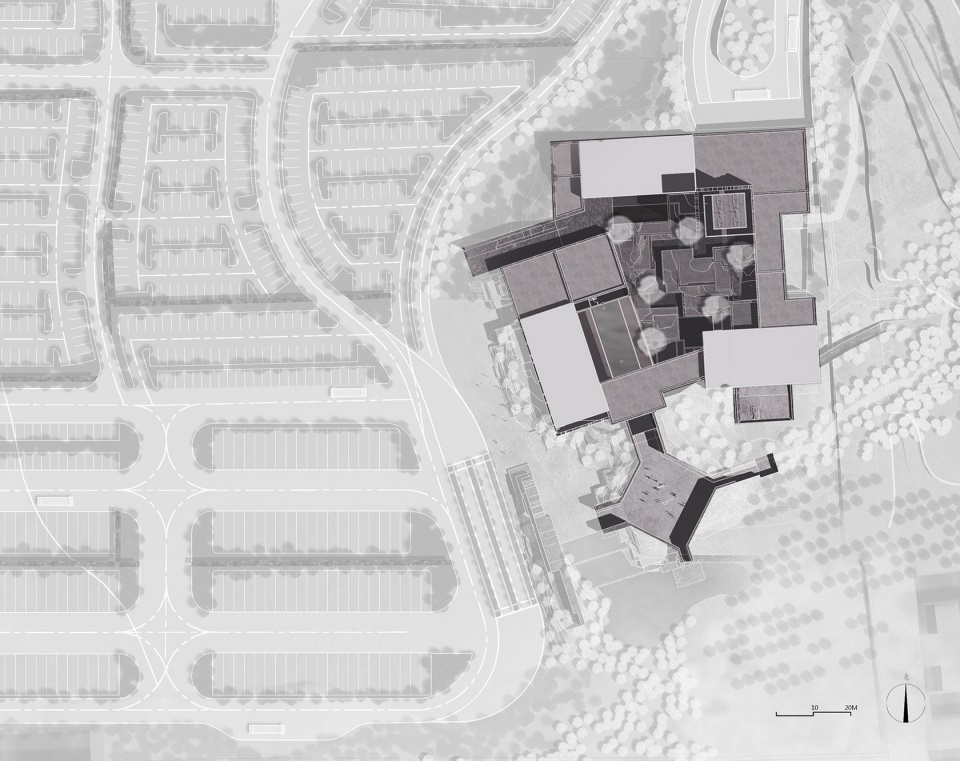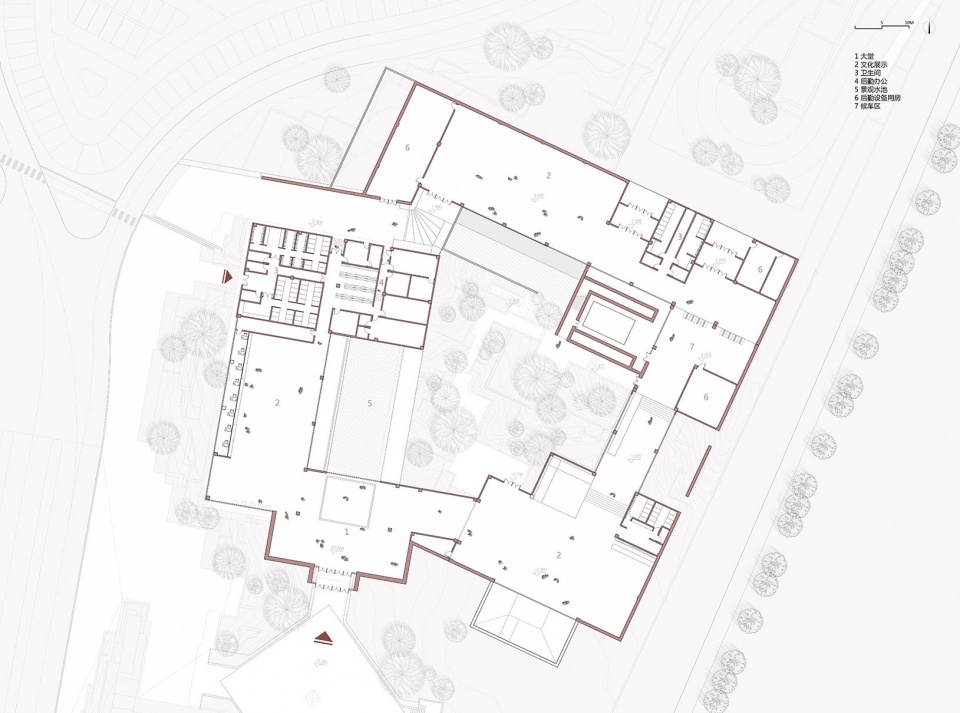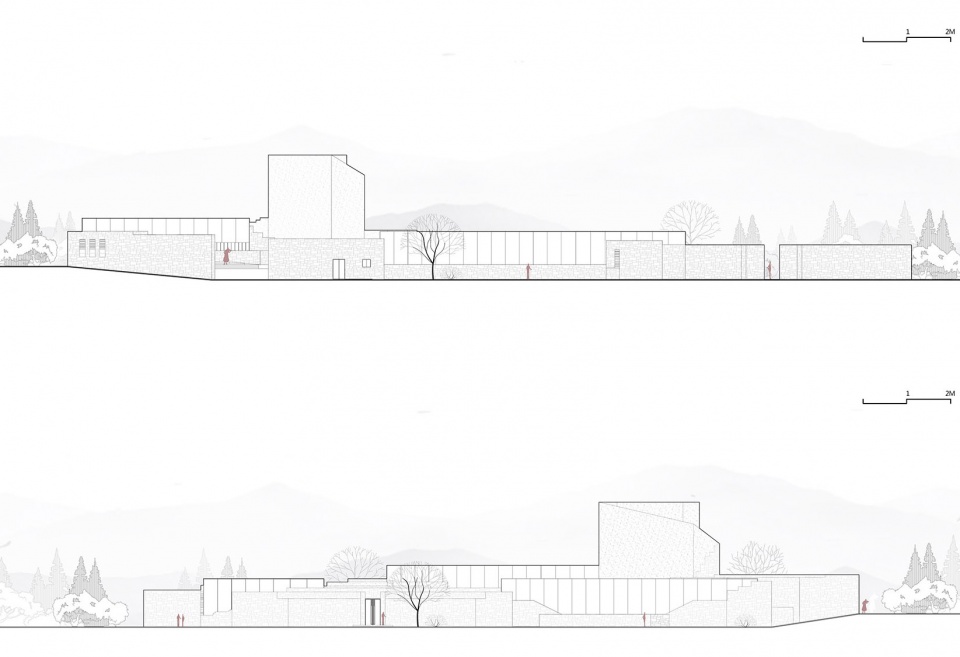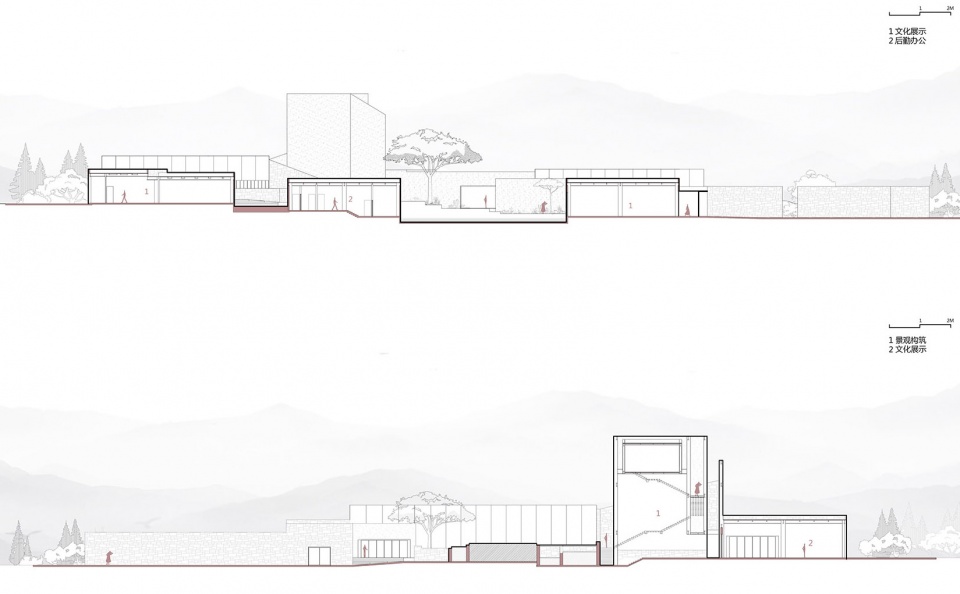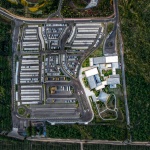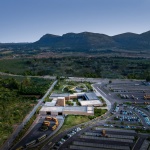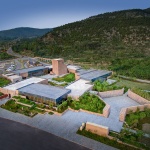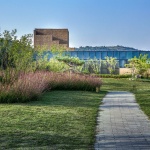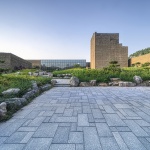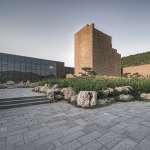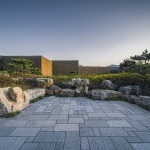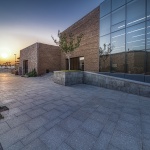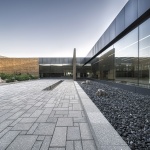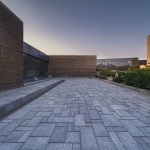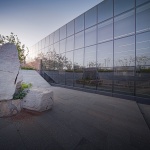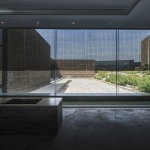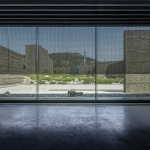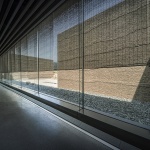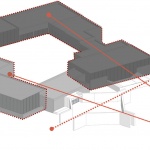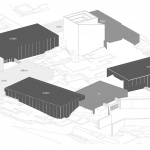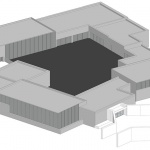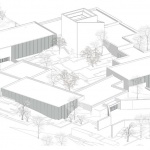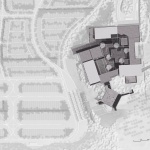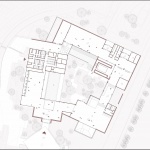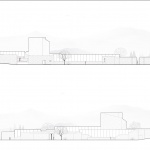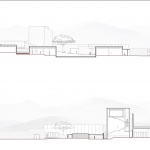非常感谢 凡度设计事务所 予gooood分享以下内容。
Appreciations towards 凡度设计事务所 for providing the following description:
孔子生鲁昌平乡陬邑,其先宋人——《史记·孔子世家》。据田野调查,今天曲阜东南“鲁源村”即为《史记》所载“陬邑”。鲁源村北靠尼山,南面昌平山。昌平山脚下即是颇有名气,自东向西流淌的沂水——圣人门前水倒流。孔子故里文化馆占地5000平方米,其位于鲁源村的村尾,尼山西侧。
According to Records of the Historian, Confucius was born in Changping Township, Zouyi in the State of Lu, and his ancestors migrated from the Song state to the Lu state. Zouyi in Records of the Historian is Luyuan Village of Qufu City, Shandong Province today on the basis of field investigation. The village is north of Mount Changping and south of Mount Ni. The well-known river Yishui River flows westward at the foot of Mount Changping. The tourist center of Confucius’s home village is at the end of Luyuan Village and on the north side of Mount Ni, covering an area of 5,000 square metre.
▼项目鸟瞰,aerial view of the project © iNNS 合什建筑摄影
对历史的敬畏和对环境的尊重是我们设计的出发点。尼山,是具有灵性的,“不宜动山”是合作的景观设计师庄先生的好建议。设计中尽可能的将建筑旁的尼山与远处的昌平山纳入我们的所创造的环境中。同时将尼山与建筑相融合,让建筑成为山体的一部分一直是我们努力的方向。
Reverence toward history and respect for environment are the starting point of our design. Mount Ni is endowed with the fine spirits of the universe, and our landscape designer Mr. Zhuang suggests that “It’s inadvisable to change the mountain.” We have tried our best to bring Mount Ni beside the buildings and Mount Changping into the environment we create, and incorporate the buildings into Mount Ni. We have always been devoting ourselves to blend buildings with mountains.
▼俯瞰项目以其周边环境,overlooking the project with its surroundings © iNNS 合什建筑摄影
人与自然主观艺术性的对话,是中国文化中非常精彩的部分。因此在设计中我们特别注重了建筑与尼山峰顶;建筑与昌平山的视线通廊,并在两条视线的交汇处围合形成建筑入口的方场,更以此形成两套轴网,以表达对自然的所有敬意。
▼轴测图,axonometric drawing © 凡度设计事务所
▼轴测图,axonometric drawing © 凡度设计事务所
The artistic dialogue between human and nature in a subjective manner is the quintessence of Chinese culture. We, therefore, lay emphasis on the corridors of sight line between buildings versus the summit of Mount Ni and the buildings versus Mount Changping in design. In a bid to pay tribute to nature to the fullest, a square at the building’s entrance is formed at the intersection between lines of sight, thereby forming two axis nets.
▼项目概览,overview of the project © iNNS 合什建筑摄影
《千字文》里说,“空谷传声,虚堂习听”。中国建筑的核心不是建筑实体,而是空间虚体。我们将所有功能围绕一个精彩的庭院展开,庭院中面向昌平山设置观景塔,让到访者在此见证圣人诞生地。建筑空间布局借鉴传统的“廊”串“堂”的布局方式,将三大功能空间(售票大厅、展示大厅、休闲大厅)作为主要的“厅堂”。这种方式即保留传统空间营造中最精妙的部分,也摆脱了传统等级制度下的生硬布局方式。排布中将这三个主体空间根据与尼山和昌平山的视线关系具体布置——“售票大厅“视线穿过中庭可远眺尼山主峰;“展示大厅”只在朝向昌平山的方向形成大面积落地窗,结合室外景观与昌平山形成具有纪念意义的场所;“休闲大厅”朝向内庭打开,回程游客可在庭院中遥望昌平山。
▼轴线对景,axis alignment © 凡度设计事务所
According to The Thousand Character Essay, “The empty valleys broadly resonate, in hallow halls wisely officiate.” The kernel Chinese architecture is open voids rather than solid mass. All functions are around a gorgeous courtyard, and a landscape tower where visitors can witness Confucius’s birthplace is constructed in the courtyard in the direction of Mount Changping. We have drawn lessons from traditional distribution of corridors and halls in terms of the spatial distribution of architecture and take the three functional spaces (Ticket Hall, Exhibition Hall and Leisure Hall) as the main hall, which not only retains the cream of traditional space construction but also gets rid of the rigid layout in the traditional hierarchy. These three functional spaces have been arranged in terms of their line-of-sight relationship with Mount Ni and Mount Changping. One can look the main peak of Mount Ni in the distance through the atrium from “Ticket Hall”; only in the direction of Mount Changpibg, are large french windows, with which outdoor landscape and Mount Changping forms a memorable site, mounted in “Exhibition Hall”; “Leisure Hall” is open to the patio, so tourists are able to look Mount Changping in the distance in the courtyard.
▼通往文化展示厅的园林小径,garden path leading to cultural exhibition hall © iNNS 合什建筑摄影
▼用石块和绿植装点的庭院,courtyard decorated with stones and greenery © iNNS 合什建筑摄影
设计过程中,最不愿凸显的则为建筑的形象,其与环境及室内完全融合为一个整体,谦逊的,安静的卧坐在圣人故里,不分彼此。子曰:“质胜文则野,文胜质则史,文质彬彬,然后君子”——《论语·雍也》。因此,建筑、环境与室内均充分运用当地的石材与夯土材料为基础,同时延续“廊道”与“厅堂”的空间概念,外部运用宽大沉稳的木隔扇,内部亦采用木质稍做装饰。这种质朴与精致的运用力图达到“文”和“质”的平衡得当。
▼位于庭院后方的文化展示厅,a cultural exhibition hall at the rear of the courtyard © iNNS 合什建筑摄影
We are loath to give prominence to the image of architecture in the process of design so as to make the building, environment and interior fuse together. Hence visitors, modest and quiet, will be able to indulge in Confucius’s home village. Confucius said, “When one’s inner disposition is in excess of his outward grace, he will look uncultured; when one’s outward grace is in excess of his inner disposition he will seem to be superficial. Only when his inner disposition and outward grace are in balance can he be a man of virtue.” (The Analects) Accordingly, local stone and rammed earth have been applied in the building, environment and interior, and the spatial concept of “corridors” and “halls” has been continued by installing spacious wooden screens outside the building and decorating the interior with wooden ornament. The application of simplicity and delicacy is to achieve a balance between “Form” and “Content”.
▼文化展厅的外立面,the facade of the Culture Exhibition hall © iNNS 合什建筑摄影
▼展厅入口,entrance of the Culture Exhibition hall © iNNS 合什建筑摄影
自然与历史体现着更优越的东西,也是中国文化的根系所在,这与现代建筑的“建筑中心论”有着本质的区别。我们庆幸和诸多睿智者合作,以集体的智慧,将人与历史&自然连接在一起,形成了一处融于环境且具有历史时间魅力,又符合当下人使用诉求的“自然场所”。这种方式,不仅是一种新建筑的探索,更是关注那个曾经充满自然山水诗意生活世界的重建。
Both nature and history reflect superiority, which is the foundation of Chinese culture and entirely different from “the architecture-oriented theory” of modern architecture. We consider ourselves lucky to work together with so many wise persons. The collective wisdom has linked human beings to history and nature, and “a natural place”, which blends into environment, is with a historical charm and meet the demand of current people, comes into being. It focuses not only on the exploration of new architecture, but also on the reconstruction of the once-poetic world.
▼展厅内部,inside the Culture Exhibition hall © iNNS 合什建筑摄影
▼总平面图,site plan © 凡度设计事务所
▼一层平面,first floor plan © 凡度设计事务所
▼立面图,elevation © 凡度设计事务所
▼剖面图,section © 凡度设计事务所
项目名称:孔子故里文化馆
规划&建筑设计:凡度设计事务所
景观设计:TOPO建筑环境设计公司
室内设计:凡度设计事务所,金螳螂建筑装饰有限公司
项目设计 & 完成年份:2017年设计开始-2019年建造完成
主持设计:吴茂辉、李宽、谢鑫
设计团队:黄昕波、赵伟、张虬、谢念航、于昊、俞琰玲、高浩峰
项目地址:山东曲阜尼山圣境
建筑面积:5000平方米
摄影版权:iNNS 合什建筑摄影
客户:曲阜尼山文化旅游投资发展有限公司
More: 凡度设计事务所



